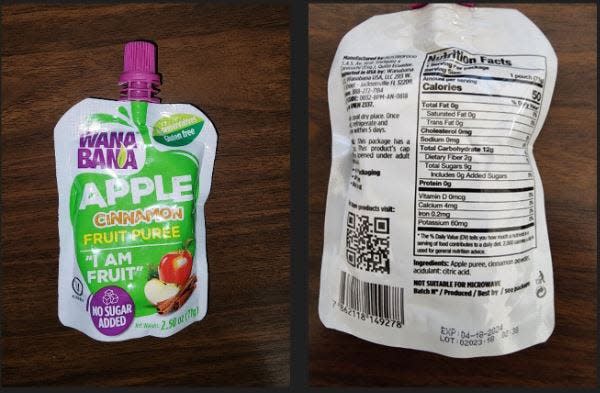FDA issues warning: fruit puree linked to ‘potential acute lead toxicity’ in 4 WNC kids

The U.S. Food and Drug Administration released an advisory Oct. 28 warning parents to stay away from WanaBana apple cinnamon fruit puree pouches after a Madison County child's lead poisoning case has ignited a national investigation.
The Food and Drug Administration announced the WanaBana pouches may contain elevated levels after a joint investigation by the North Carolina Department of Health and Human Services, local health departments, the North Carolina Department of Agriculture and Consumer Services and the Food and Drug Administration, the FDA release said.
In the release, the FDA said it was recently made aware of a developing investigation by the NCDHHS and the N.C. Department of Agriculture regarding four children in Western North Carolina counties who had elevated blood lead levels, indicating potential acute lead toxicity.
The pouches are sold nationally and are available through multiple retailers including Sam’s Club, Amazon and Dollar Tree.
Madison County Health Director Tammy Cody shared with The News-Record & Sentinel the county's updated lead prevention policy and best clinical practices document Oct. 30.
Cody said the NCDHHS initiated its investigation in response to a case in Madison County, and the Madison County Health Department has been working with the family for more than two months, including monitoring the elevated lead levels.
"They increased with the last blood draw (finger stick) which prompted further evaluation. Our environmental health staff went with state personnel to the family home for a detailed investigation," Cody said. "As is normal, many samples both inside and outside of the house were taken and sent to the state lab for analysis. Samples of the fruit pouches, in various flavors, were submitted for analysis. The apple cinnamon came back with high levels of lead."
Cody said the other three cases were seen in children from Catawba and Cleveland Counties.
Brittany Byers is Madison County Health Department's lead nurse.
In the document Byers said her role as the lead nurse for the county is to manage care for each child to ensure the parents receive the education and knowledge they need to ensure their child’s lead will come down.
Byers also shared some major points for providers, nurses and lead staff in the document.
"All 12- and 24-month-olds should receive a capillary lead screening at their well child visits," Byers said in the document. "All 12-month-olds should receive hemoglobin screening as well (typically this will be low when a child has an elevated blood lead).
She also said all siblings younger than 6 years old should also be screened when an elevated blood lead case is found in the home, and to be vigilant with any foster or adopted child younger than 6 to ensure they’ve been screened.
"Any child that is a refugee should be screened between the ages of six months and 16 years old. Even if this screening is normal, rescreen in three to six months."
According to Byers, all levels above 5 are considered abnormal and will need a follow-up.
"All elevated levels (above 5) will need a diagnostic (venous draw) to confirm elevation, although they will accept another capillary if necessary. Confirmation must occur within 12 months of the initial elevated lead screening (although the sooner the better)," said in the document.
"There must be two consecutive lead tests below a 5 to be considered normal. In some cases, it can take years for a blood lead to decrease to normal if the lead has been absorbed into the bone."
To report a complaint or adverse event (illness or serious allergic reaction), you can:
Call an FDA Consumer Complaint Coordinator if you wish to speak directly to a person about your problem.
Complete an electronic Voluntary MedWatch form online.
Complete a paper Voluntary MedWatch form that can be mailed to FDA.
Visit www.fda.gov/fcic for additional consumer and industry assistance.
NCDHHS recommends consumers dispose of the WanaBana brand apple cinnamon puree products immediately, and discuss blood lead testing with their medical providers if there is a concern about their child.
According to Byers, in nine years working as lead nurse, the highest level she managed was a 12.
"We were able to decrease this child’s level after two years through education and the family moving out of the lead infested home," Byers said. "I hope to never see a lead higher than this in Madison County, but if so, we will manage the situation with priority."
For more information and resources on child lead poisoning, please visit ehs.dph.ncdhhs.gov/hhccehb/cehu.
This article originally appeared on Asheville Citizen Times: FDA recalls product in response to Madison child’s lead poisoning
